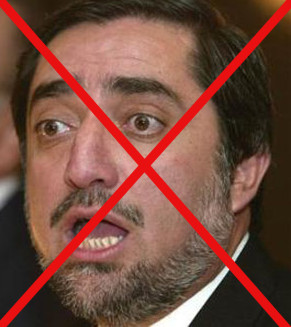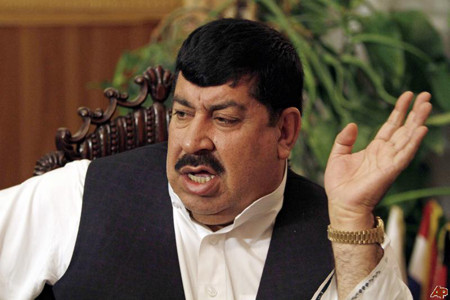By Matthew Rosenberg and Rod Nordland
KABUL, Afghanistan — The deadline for registering as a candidate in Afghanistan’s coming presidential election was Sunday, and the election commission had a request for contenders: When you come to declare your candidacy, do not bring your gunmen.
Afghan and Western officials have for months described the election, scheduled for April 5, as a chance for Afghans to decide the path their country will take as the forces of the American-led coalition depart. Yet, there is a reason candidates tend to travel with heavily armed guards, and the official optimism has masked a far deeper pessimism here that the vote will be marred by fraud and plagued by violence.
On Sunday, with the final list of candidates set, Afghans and Western officials added another item to the growing list of concerns about the vote: the candidates themselves.
There is the professorial technocrat and the urbane diplomat, neither of whom has any natural constituency in Afghanistan. There is a man accused of being a pedophile who was once a darling of the Central Intelligence Agency, and another accused of war crimes who once tried to enact a law granting amnesty to people accused of war crimes. And then there is the candidate who would not even get the vote of his own brother, and his brother is President Hamid Karzai, the man they are all vying to replace.

RAWA.org: Abdullah Abdullah, usually painted as a man with a clean past by the mainstream media, was one of the closest people and adviser to Ahmad Shah Massoud (deceased) whose party is accused of committing systematic war crimes, killing countless civilians, and for the famous Afshar massacre during the Afghan civil war (1992-1996). He was also the spokesperson of the 1992-1996 government at one point.
The candidates, in many ways, represent a cross section of the political and economic elite that has risen in Afghanistan in the past dozen years with the support of the United States. For all the strivers who have ushered Afghanistan into the modern world since the Taliban were ousted — building Web sites, campaigning for women’s rights, starting television networks — the election seems destined to remind everyone that this is still a country governed by conservative old men, many with checkered pasts.
The early leader is Zalmay Rassoul, a polished former foreign minister who would be welcome in any Western capital but lacks a significant constituency in Afghanistan. That may not matter, though, if the conventional wisdom here is accurate: Mr. Rassoul is believed to be the favorite of Mr. Karzai, who has solidified his hold on Afghanistan’s electoral machinery in hopes of seeing a pliable successor elected.
The leading opposition candidate, Abdullah Abdullah, placed second to Mr. Karzai in the 2009 election, which saw tens of thousands of fraudulent votes thrown out. He, too, is polished and is seen as relatively clean in a country where corruption and criminality are so pervasive among the political class that Western diplomats acknowledge that no one with any power is totally clean.
His running mates are a different story. If elected, his first vice president would be Mohammad Khan, a Pashtun official of the Hezb-i-Islami Party, whose militant wing is still fielding insurgents against the government. His second vice president would be Mohammad Mohaqiq, a leader of the Hazara ethnic group who stands accused of war crimes.
In fact, it was the bodyguards protecting Mr. Mohaqiq who prompted the election commission to ask for guns to be kept out of its compound. When Mr. Abdullah, Mr. Khan and he arrived to register on Wednesday, his bodyguards got into a fight with the men guarding the commission chairman, Ahmad Yousuf Nuristani.
Another presidential candidate is Qayum Karzai, the president’s older brother. He owns restaurants in Baltimore and served briefly as a member of the Afghan Parliament. More recently, he served as an unofficial adviser to his brother, who has, nonetheless, so far refused to back him.
President Karzai made one last, futile attempt on Saturday night to persuade Qayum Karzai to stay out of the race, according to advisers to the president.
A fourth candidate is Abdul Rab Rassoul Sayyaf, who is also accused of war crimes and whose signature initiative during a stint in Parliament was trying to enact a law granting amnesty to those accused of war crimes. He also tried to repeal the Elimination of Violence Against Women Act.
Yet the roots of his infamy run far deeper than the accusation he faces: He is the man who first brought Osama bin Laden to Afghanistan.
Also running is Ashraf Ghani, a professorial former World Bank expert who most recently served as one of President Karzai’s top advisers. He ran for president in the 2009 election, placing a distant fourth with about 3 percent of the vote. Few here believe he can do much better this time, despite his name recognition among Westerners in Kabul and Washington.

The New York Times, Oct. 6, 2013: And then there is Gul Agha Shirzai, a former governor of Nangarhar and Kandahar Provinces who is accused of abusing children. Though he vehemently denies the accusations, many diplomats, journalists and Afghan officials say they have seen Mr. Shirzai at social occasions with bacha bazi, underage boys who dance dressed as girls and are often kept as personal sex slaves by powerful Afghan men, particularly warlords. (Photo: Rahmat Gul/AP)
And then there is Gul Agha Shirzai, a former governor of Nangarhar and Kandahar Provinces who is accused of abusing children. Though he vehemently denies the accusations, many diplomats, journalists and Afghan officials say they have seen Mr. Shirzai at social occasions with bacha bazi, underage boys who dance dressed as girls and are often kept as personal sex slaves by powerful Afghan men, particularly warlords.
However frivolous some of these contenders may appear, each of them had to submit nominating papers with 100,000 signatures by Sunday, as well as a cash bond of about $20,000.
All told, 28 candidates were expected to register before midnight on Sunday. With President Karzai unable to run because of a constitutional two-term limit, the field is far more open than it was last time, and handicapping the race is nearly impossible.
There are no polls or significant political parties in Afghanistan, and there is little talk of policies apart from candidates’ making vague remarks about improving the economy and bringing peace.
The country is run on patronage, and the politics are no different. Candidates rely on cash and ethnic and regional loyalties to secure votes, looking for running mates who can help fatten bank accounts and diversify their appeal. If the presidential candidate is a southern Pashtun, from Afghanistan’s largest ethnic group, he seeks out a northern Tajik and a Hazara or Uzbek to fill the two vice-presidential slots.
This being Afghanistan, where deadlines are often aspirational, a rush of candidates tried to register on Sunday. While all appeared to heed the request to keep guns out of the commission’s sprawling compound on the outskirts of Kabul, each did arrive with hundreds of supporters.
The bustle of turbaned elders and youngish aides in smart suits moving in and out of the commission’s ordinarily quiet compound lent a festive air to the proceedings. But it also overwhelmed the commission, which had to stay open until midnight, eight hours past its appointed closing time, to accommodate all those who wanted to register.
The presidential palace was said to be just as packed throughout much of the day. Sitting officials are not allowed to run for president or vice president, and all day long cabinet ministers and governors showed up to have President Karzai sign their resignations so they could sign on to a presidential ticket, Afghan officials said.
Jawad Sukhanyar contributed reporting.



